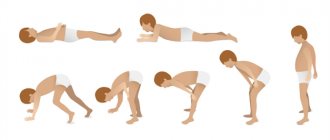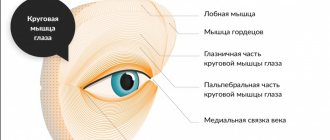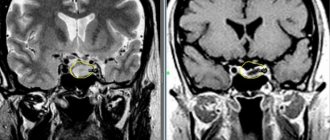The use of narcotic substances and mental changes in drug addicts no longer surprise anyone, but it turns out that completely harmless things can cause the development of an inadequate state: medications or caffeine. Amphetamine psychosis is a dangerous condition that occurs when certain drugs are abused. Hallucinations, delusions, agitation - the patient’s behavior seems completely abnormal, he becomes dangerous to others, and his psyche is quickly destroyed. Unfortunately, this condition is often diagnosed in adolescents, so it is important to know all the signs of drug use and amphetamines in order to immediately suspect their use.
Symptoms
The symptoms caused by different stimulants differ slightly, but share common features with organic psychoses, such as hallucinations, delusions, thinking disorders, and, in rare cases, catatonia.
Physical symptoms of long-term stimulant abuse or overdose often accompany stimulant psychoses (but not organic psychoses). These additional symptoms may include aggression, arrhythmia, dilated pupils, diarrhea, hypertension, hyperthermia, nausea, increased breathing, restlessness, seizures, sleep deprivation, tremors, vomiting.
What after?
Sooner or later the effect of amphetamine wears off. When intoxication begins to gradually “fade away,” the person returns to a normal state. And he doesn’t remember what happened to him before. Psychosis gives way to depression, in which the addict feels overwhelmed, depressed and unhappy.
Then the withdrawal begins. The feeling of “omnipotence” experienced by a person under the influence of a drug is replaced by lethargy. To return to the previous level, the addict takes another dose, this time larger.
An increase in the amount of amphetamine consumed is fraught with severe headaches, blurred vision and excessive cardiac stress. Often amphetamine addicts develop arrhythmia and heart failure. However, the worst consequence is hemorrhagic stroke and coma.
It is also worth mentioning that the drug removes calcium from the body, and this is fraught with problems with bones and teeth.
It is very difficult to survive “withdrawal”. Only time will help. You need to drink a lot of water, it is better to induce vomiting. Painkillers may help a little. Since withdrawal is accompanied by increased aggression, it is important that the person remains calm. Corvalol, motherwort or valerian can help here.
Stimulants that cause psychosis
Amphetamine
Amphetamine and its derivatives (amphetamines) are known to cause psychosis when abused chronically or in high doses[2]. The word “amphetamines” refers to both (±)-1-phenylpropan-2-amine itself and its substituted derivatives. Examples of amphetamine derivatives: cathinone, ephedrone, methamphetamine, methcathinone, methylphenidate.
Symptoms of amphetamine psychosis include auditory and visual hallucinations, delusions of persecution and delusions of relation, simultaneously with clear consciousness and extreme agitation[3][4], sometimes there may be individual signs of mental automatism syndrome (Kandinsky-Clerambault syndrome)[5]. At the same time, the person experiences tension and anxiety. Hallucinations are usually true, but pseudohallucinations can also be observed [6].
Sometimes a microhallucinatory-paranoid syndrome occurs, as with cocaine use[6]. It manifests itself in the sensations of small insects on the body, or worms, dots, threads.
In rare cases, catatonic stupor or catatonic agitation, a manic state, a state of ecstasy with fussiness and vividness of perceptions, a syndrome of obsessive states against a background of depressive-dysphoric mood occur[7].
The symptoms of acute amphetamine psychosis are very similar to the acute phase of schizophrenia[2]. Sometimes people in a state of amphetamine psychosis observed sperrungs (breaks in the associative process), insertion or subtraction of thoughts, echo of thoughts (the sound of one’s own thoughts), reasoning, and inappropriate facial expressions[7].
Psychosis was recorded only with the use of 50 mg of amphetamine, but in some cases even dosages of 650 mg did not cause psychosis. This amount of the substance was administered 8 times to a healthy person, and he experienced only euphoria, increased libido, increased mental activity and productivity. Each time after the end of the effect of the substance, depression, memory impairment and decreased sexual desire were observed, but psychosis did not occur[8].
With continued use of amphetamine, psychosis increases, so treatment requires its immediate withdrawal [9].
Psychosis with one-time use
One patient developed seizures and further “fuzzy consciousness” from a single dose of 140 mg of amphetamine[10].
There is a known case of delirium in a 7.5-year-old child who consumed 300 mg of amphetamine during the period of recovery from pharyngitis. Delirium was accompanied by hallucinations; the child observed small crawling insects in the corners of the room, experienced horror and was disoriented. At the physical level, there was an increase in temperature, dilated pupils, and loss of coordination. The duration of this psychosis was less than a day, and it ended with complete recovery[11].
Duration of psychosis
The duration of psychosis as a result of acute poisoning usually lasts 1-3 days, in extremely rare cases it extends to a maximum of 1 week with a large amount of the drug used.
Connell studied 30 amphetamine abusers. In 2 of them, psychosis passed after 5-7 weeks, in 5 people - 2-4 weeks, in 1 - after 2 weeks, and in the majority - 15 people - psychosis passed in less than 1 week. The medical history of the remaining 7 is unknown[12].
In rare cases, psychosis can last 2-7 months[9] or even more than 3 years[7] after stopping amphetamine use. Allier described a man who had been ill for 1.5 years with the presence of pseudohallucinations of a commentary nature (“voices”) and the feeling of being controlled. In particular, he wrote that the patient believed that he (and other people) were controlled using radar from the Vatican[13].
According to a study by Sano and Nagasaka, of 599 patients who abused amphetamine, 62% developed psychosis, which ended in rapid recovery. In 10% of patients, psychosis did not resolve after 6 months after stopping the drug[14].
Somatic and neurological symptoms
Acute amphetamine psychosis may be accompanied by the following somatic symptoms: tachycardia, mydriasis, tremor, increased tendon reflexes, dry mouth [15]. However, with prolonged psychosis, these symptoms may be absent.
Cocaine
Cocaine has the same potential to cause short-term psychosis[16]. More than half of cocaine abusers reported some psychotic symptoms[17]. Typical symptoms include paranoid delusions: people feel like they are being watched. Hallucinations associated with delusional ideas often occur[17]. Delusional parasitosis with goosebumps is also a fairly common reaction[18].
Methcathinone (ephedron)
Methcathinone psychosis usually develops against a background of severe insomnia and general exhaustion of the body. It occurs in the form of rudimentary or acute paranoid with delusions of persecution, delusions of special significance, visual or verbal hallucinations[19]. Verbal hallucinosis and delusions of jealousy are rare[19]. The literature also describes cases of amentia-like psychosis and twilight stupefaction [19].
Methcathinone psychosis usually lasts 3-4 hours (in some patients the duration can be up to 1 month)[19].
Methylphenidate
Methylphenidate, better known by its trade name Ritalin, is a central nervous system stimulant with a mechanism of action similar to cocaine[20][21]. This substance can also lead to psychosis if abused chronically[22][23].
Methamphetamine
One Australian study found that 18% of 309 active methamphetamine users had experienced psychosis in the past year[24].
Symptoms of methamphetamine psychosis: auditory, visual, tactile and olfactory hallucinations, delusions of persecution and delusions of relationships (the patient’s erroneous assessment of other people’s attitudes towards him), compulsive behavior, stereotypies, anhedonia, depression, flattened affect[25]. Most often, psychosis occurs in the form of rudimentary or acute paranoid with delusions of persecution, of special significance, with visual or verbal hallucinations [26]. Like amphetamine psychosis, it is similar to the psychosis of patients with schizophrenia[25]. Manic-delusional psychoses are also described in the literature[26].
A case has been described of the occurrence of twilight stupefaction in a patient who had been abusing methamphetamine for about 2 years[27]. The condition lasted 8 days, during which the patient experienced visual and auditory hallucinations, heard the voice of the planet Mars, and believed that in this way this planet was trying to come into contact with the Earth. Tachycardia up to 120 per minute, mydriasis and arterial hypertension were also observed.
Methamphetamine psychosis usually occurs after many days of using the substance, in doses of 6-11 ml intravenously per day[26]. The duration of a psychotic disorder is usually from 8 to 10 hours, but can also last up to 1 month[26].
Caffeine
It has been suggested that caffeine, in large doses or when abused chronically, may cause psychosis in healthy people or worsen existing psychosis in patients [apps.who.int/classifications/icd10/browse/2010/en#/F20 20]20. (schizophrenia)[28][29][30].
Caffeine, theobromine, theophylline in high doses with chronic use can lead to exhaustion of the nervous system, which can become the basis for subsequent psychosis[31].
The most commonly described occurrence of delirium is caffeine overdose[32]. There is an influx of vivid visual hallucinations, sometimes auditory, and the person loses orientation in the world around him. After caffeine is removed from the body, the memory of the past is partially or completely retained. Some patients lose the ability to correctly judge distances, and objects seem closer to them than they really are [33]. Somatic disorders accompanying delirium: mydriasis, hyperemia, ataxia, tachycardia, severe thirst, dry skin and mucous membranes, cyanosis of the skin, sometimes increased blood pressure and increased body temperature [34].
There is a known case in which an elderly woman who drank 300 grams of coffee daily for two years experienced psychosis with disorientation in the environment, episodic visual hallucinations, euphoria, agitation, which ended in death[35].
Psychosis with impaired consciousness due to caffeine poisoning usually lasts no more than a few days[36].
How to behave
There is no point in reassuring the patient or appealing to his conscience. You should not try to prevent the development of the disease through brute force or scandal.
If a patient develops psychosis, immediately call emergency psychiatric care from a specialized medical institution, which is a drug treatment clinic.
The development of mental illness can only be stopped through the administration of special medications and hospitalization of the patient if the process has gone too far.
Designation in ICD-10
In the International Classification of Diseases, 10th revision, psychotic disorders associated with stimulant use are designated by the following codes:
- F14.50 Schizophrenia-like disorder due to cocaine use
- F14.51 Predominantly delusional disorder due to cocaine use
- F14.52 Predominantly hallucinatory disorder due to cocaine use
- F14.53 Predominantly polymorphic psychotic disorder due to cocaine use
- F14.54 Cocaine use disorder with predominantly depressive psychotic symptoms
- F14.55 Cocaine use disorder with predominantly manic psychotic symptoms
- F15.50 Schizophrenia-like disorder associated with use of other stimulants (including caffeine)
- F15.51 Predominantly delusional disorder associated with the use of other stimulants (including caffeine)
- F15.52 Predominantly hallucinatory disorder associated with use of other stimulants (including caffeine)
- F15.53 Predominantly polymorphic psychotic disorder associated with the use of other stimulants (including caffeine)
- F15.54 Other stimulant use disorder (including caffeine) with predominantly depressive psychotic symptoms
- F15.55 Other stimulant use disorder (including caffeine) with predominantly manic psychotic symptoms
Treatment
Treatment of stimulant psychosis involves managing symptoms during the acute phase of intoxication: maintaining normal body temperature, blood pressure and heart rate at acceptable levels until the substance is successfully metabolized and vital body functions return to baseline. In the early stages of treatment, typical and atypical antipsychotic drugs are indicated[2].
For patients with arterial hypertension, it is preferable to prescribe chlorpromazine (aminazine), since it, in addition to dopamine receptors (D₁, D₂, D₃ and D₄), blocks α-adrenergic receptors [37]. The standard dosage is 50 mg 4 times a day, but can be increased to 100 mg[37]. For more severe hypertension or tachyarrhythmia, β-blockers such as propranolol (1 mg IV every 5-10 minutes until a dose of 8 mg) are prescribed [37].
Haloperidol 5 mg 2 times a day may be prescribed[37].
Diazepam, lorazepam, or other benzodiazepines may be used to produce additional sedation[37].
What does the patient's behavior look like from the outside?
During an attack, the patient's motor activity increases. A person constantly rushes about, makes a large number of chaotic movements that do not have any purpose. Can't concentrate on anything. Thoughts are quickly replaced by new ones, because of this the patient often does not finish the sentence and begins a new one in the middle of the previous one. Speech is choppy and unclear.
The mood changes quickly. Changes are not motivated by external factors and are spontaneous. Changes from euphoria to apathy and stupor are possible. Unmotivated aggression occurs and a high level of anxiety is noted. The patient is irritable and may become irritated for no reason. Panic attacks are possible when meeting people. The reaction to others is unpredictable and inadequate.
Hallucinations appear. A person sees and hears non-existent objects. The perception of the world is distorted.
The delusion is similar to paranoid delusion. The patient may feel that he is being persecuted, that they are trying to kill him, and that he sees conspiracies and bad intentions.
After the attack ends, memories of it disappear. The person falls into a depressed state, is apathetic, does not show interest in life and activities that previously gave him pleasure.
Notes
- Curran, Catherine et al., [bjp.rcpsych.org/cgi/content/abstract/185/3/196 Stimulant psychosis: systematic review], The British Journal of Psychiatry (2004) 185: 196–204
- ↑ 1 2 3
Shoptaw SJ, Kao U, Ling W. [www.ncbi.nlm.nih.gov/pubmed/18843639 Treatment for amphetamine psychosis].
Cochrane Database of Systematic Reviews
2009 Issue 1. - Dore G, Sweeting M. [www.ncbi.nlm.nih.gov/pubmed/16630206 Drug-induced psychosis associated with crystalline methamphetamine]. Australasian Psychiatry
2006;14(1):86-9. - Srisurapanont M, Ali R, Marsden J, Sunga A, Wada K, Monteiro M. [www.ncbi.nlm.nih.gov/pubmed/14604449 Psychotic symptoms in methamphetamine psychotic in-patients]. International Journal of Neuropsychopharmacology
2003;6(4):347-52. - L.K. Shaidukova.
Classic narcology. - 2008. - P. 47. - 260 p. — ISBN 978-5-94981-091-0. - ↑ 12
Stolyarov, 1964, p. 120. - ↑ 123
Stolyarov, 1964, p. 121. - Waud SP [jama.jamanetwork.com/article.aspx?articleid=279811 The effects of toxic doses of benzyl methyl carbinamine (Benzedrine) in man]. Journal of the American Medical Association
, 1938 - ↑ 12
Stolyarov, 1964, p. 122. - Apfelberg B. - Acta Neurol, 1960, v. 15, p. 355
- Shanson B. Amphetamine poisoning
. Brit. med. J., 1956, p. I, p. 576 - Connell PH
Amphetamine Psychosis. - London: Oxford University Press, 1961. - Alliez, J. (1953) Délire amphétaminique
. L'Encephale 42: 21 - Sano I., Nagasaka Uber chronische Weckaminsucht in Japan
. Fortschr. Neurol Psychiat., 1956, Bd. 24, S. 391 - Stolyarov, 1964, p. 123.
- Brady KT, Lydiard RB, Malcolm R, Ballenger JC. [www.ncbi.nlm.nih.gov/pubmed/1752853 Cocaine-induced psychosis]. J Clin Psychiatry
. 1991;52:509-512. - ↑ 1 2 Thirthalli, Jagadisha;
Vivek Bengal. [www.medscape.com/viewarticle/528487_5 Psychosis Among Substance Users]. Department of Psychiatry, National Institute of Mental Health and Neuro Sciences (NIMHANS), Bangalore, India. Retrieved July 2, 2020. [www.webcitation.org/6E1srtShn Archived from the original on January 29, 2013]. - Elliott, A., Mahmood, T., Smalligan, R.D. (2012), Cocaine bugs: a case report of cocaine-induced delusions of parasitosis]. The American Journal on Addictions
, 21: 180–181. - ↑ 1234
Ivanets, Tyulpin et al., 2006, p. 737. - Auriel E, Hausdorff JM, Giladi N (October 2008). "Methylphenidate for the Treatment of Parkinson Disease and Other Neurological Disorders." Clin Neuropharmacol 32
(2):75–81. DOI:10.1097/WNF.0B013E318170576C. PMID 18978488. - Abramowicz MJ, Van Haecke P, Demedts M, Delcroix M (September 2003). “[erj.ersjournals.com/cgi/content/full/22/3/560 Primary pulmonary hypertension after amfepramone (diethylpropion) with BMPR2 mutation].” Eur. Respira. J. 22
(3):560–2. DOI:10.1183/09031936.03.00095303. PMID 14516151. - Morton WA, Stockton GG. Methylphenidate abuse and psychiatric side effects. Prim Care Companion J Clin Psychiatry
2000;2:159-64. - Spensley J, Rockwell D (April 1972). "[www.nejm.org/doi/full/10.1056/NEJM197204202861607 Psychosis during Methylphenidate Abuse]". New England Journal of Medicine 286
: 880–1. DOI:10.1056/NEJM197204202861607. - McKetin R, McLaren J, Lubman DI, Hides L. [www.ncbi.nlm.nih.gov/pubmed/16968349 The prevalence of psychotic symptoms among methamphetamine users]. Addiction
2006;101(10):1473-8. - ↑ 1 2 Bankole A. Johnson, DSc, MD.
Addiction Medicine. - volume 1. - Springer, 2011. - P. 501. - ISBN 978-1-4419-0338-9. - ↑ 1234
Ivanets, Tyulpin et al., 2006, p. 741. - Kalus F., Kucher J., Zutt J. Über Psychosen bei chronischem Pervitin-missbrauch
. Nervenarzt, 1942, Bd. 15, S. 313 - Hedges, D. W.; F. L. Woon, S. P. Hoopes (September 2009). "Caffeine-induced psychosis." CNS Spectrums 14
(3):127–9. PMID 19407709. - Cerimele, J.M.; A.P. Stern, D. Jutras-Aswad (September 2010). "Psychosis following excessive ingestion of energy drinks in a patient with schizophrenia." American Journal of Psychiatry 167
(3): 353. DOI:10.1176/appi.ajp.2009.09101456. PMID 20194494. - Broderick P., Benjamin AB
[www.ncbi.nlm.nih.gov/pubmed/15732884 Caffeine and psychiatric symptoms: a review.] (English) // The Journal of the Oklahoma State Medical Association. - 2004. - Vol. 97, no. 12. - P. 538-542. - PMID 15732884. fix - Solinas, Marcello; Sergi Ferre, Zhi-Bing You, Marzena Karcz-Kubicha, Patrizia Popoli, Steven R. Goldberg (August 2002). “[www.jneurosci.org/content/22/15/6321.full.pdf Caffeine Induces Dopamine and Glutamate Release in the Shell of the Nucleus Accumbens].” The Journal of Neuroscience 14
(3): 127–9. Retrieved July 2, 2020. - Stolyarov, 1964, p. 140.
- Stolyarov, 1964, p. 141.
- Stolyarov, 1964, p. 140-141.
- Wagner W. - Der Nervenarzt, 1939, Bd, 12, S. 296
- Stolyarov, 1964, p. 143.
- ↑ 1 2 3 4 5 Arana J., Rosenbaum J.
Guide to psychopharmacotherapy = Handbook of Psychiatric Drug Therapy. - M.: BINOM Publishing House, 2004. - 416 p. — ISBN 5-9518-0098-6.
Excerpt characterizing Stimulant psychosis
- No peace, damned ones! - he growled with anger at someone. “Yes, yes, there was something else important, I saved something very important for myself in bed at night. Valves? No, that's what he said. No, there was something in the living room. Princess Marya was lying about something. Desalle—that fool—was saying something. There’s something in my pocket, I don’t remember.” - Quiet! What did they talk about at dinner? - About the prince, Mikhail... - Shut up, shut up. “The prince slammed his hand on the table. - Yes! I know, a letter from Prince Andrei. Princess Marya was reading. Desalles said something about Vitebsk. Now I'll read it. He ordered the letter to be taken out of his pocket and a table with lemonade and a vitushka - a wax candle - to be moved towards the bed and, putting on his glasses, he began to read. Here only in the silence of the night, in the faint light from under the green cap, did he read the letter for the first time and for a moment understand its meaning. “The French are in Vitebsk, after four crossings they can be at Smolensk; maybe they’re already there.” - Quiet! - Tikhon jumped up. - No, no, no, no! - he shouted. He hid the letter under the candlestick and closed his eyes. And he imagined the Danube, a bright afternoon, reeds, a Russian camp, and he enters, he, a young general, without one wrinkle on his face, cheerful, cheerful, ruddy, into Potemkin’s painted tent, and a burning feeling of envy for his favorite, just as strong, as then, worries him. And he remembers all the words that were said then at his first Meeting with Potemkin. And he imagines a short, fat woman with yellowness in her fat face - Mother Empress, her smiles, words when she greeted him for the first time, and he remembers her own face on the hearse and that clash with Zubov, which was then with her coffin for the right to approach her hand. “Oh, quickly, quickly return to that time, and so that everything now ends as quickly as possible, as quickly as possible, so that they leave me alone!” Bald Mountains, the estate of Prince Nikolai Andreich Bolkonsky, was located sixty versts from Smolensk, behind it, and three versts from the Moscow road. On the same evening, as the prince gave orders to Alpatych, Desalles, having demanded a meeting with Princess Marya, informed her that since the prince was not entirely healthy and was not taking any measures for his safety, and from Prince Andrei’s letter it was clear that he was staying in Bald Mountains If it is unsafe, he respectfully advises her to write a letter with Alpatych to the head of the province in Smolensk with a request to notify her about the state of affairs and the extent of the danger to which Bald Mountains are exposed. Desalle wrote a letter to the governor for Princess Marya, which she signed, and this letter was given to Alpatych with the order to submit it to the governor and, in case of danger, to return as soon as possible. Having received all the orders, Alpatych, accompanied by his family, in a white feather hat (a princely gift), with a stick, just like the prince, went out to sit in a leather tent, packed with three well-fed Savras. The bell was tied up and the bells were covered with pieces of paper. The prince did not allow anyone to ride in Bald Mountains with a bell. But Alpatych loved bells and bells on a long journey. Alpatych's courtiers, a zemstvo, a clerk, a cook - black, white, two old women, a Cossack boy, coachmen and various servants saw him off. The daughter placed chintz down pillows behind him and under him. The old lady's sister-in-law secretly slipped the bundle. One of the coachmen gave him a hand. - Well, well, women's training! Women, women! - Alpatych said puffingly, patteringly exactly as the prince spoke, and sat down in the tent. Having given the last orders about the work to the zemstvo, and in this way not imitating the prince, Alpatych took off his hat from his bald head and crossed himself three times. - If anything... you will come back, Yakov Alpatych; For Christ’s sake, have pity on us,” his wife shouted to him, hinting at rumors about war and the enemy. “Women, women, women’s gatherings,” Alpatych said to himself and drove off, looking around at the fields, some with yellowed rye, some with thick, still green oats, some still black, which were just beginning to double. Alpatych rode along, admiring the rare spring harvest this year, looking closely at the strips of rye crops on which people were beginning to reap in some places, and made his economic considerations about sowing and harvesting and whether any princely order had been forgotten. Having fed him twice on the way, by the evening of August 4th Alpatych arrived in the city. On the way, Alpatych met and overtook convoys and troops. Approaching Smolensk, he heard distant shots, but these sounds did not strike him. What struck him most was that, approaching Smolensk, he saw a beautiful field of oats, which some soldiers were mowing, apparently for food, and in which they were camping; This circumstance struck Alpatych, but he soon forgot it, thinking about his business. All the interests of Alpatych’s life for more than thirty years were limited by the will of the prince alone, and he never left this circle. Everything that did not concern the execution of the prince’s orders not only did not interest him, but did not exist for Alpatych. Alpatych, having arrived in Smolensk on the evening of August 4th, stopped across the Dnieper, in the Gachensky suburb, at an inn, with the janitor Ferapontov, with whom he had been in the habit of staying for thirty years. Ferapontov, twelve years ago, with the light hand of Alpatych, having bought a grove from the prince, began trading and now had a house, an inn and a flour shop in the province. Ferapontov was a fat, black, red-haired forty-year-old man, with thick lips, a thick bumpy nose, the same bumps over his black, frowning eyebrows and a thick belly. Ferapontov, in a waistcoat and a cotton shirt, stood at a bench overlooking the street. Seeing Alpatych, he approached him. - Welcome, Yakov Alpatych. The people are from the city, and you are going to the city,” said the owner. - So, from the city? - said Alpatych. “And I say, people are stupid.” Everyone is afraid of the Frenchman. - Women's talk, women's talk! - said Alpatych. - That’s how I judge, Yakov Alpatych. I say there is an order that they won’t let him in, which means it’s true. And the men are asking for three rubles per cart - there is no cross on them! Yakov Alpatych listened inattentively. He demanded a samovar and hay for the horses and, having drunk tea, went to bed. All night long, troops moved past the inn on the street. The next day Alpatych put on a camisole, which he wore only in the city, and went about his business. The morning was sunny, and from eight o'clock it was already hot. An expensive day for harvesting grain, as Alpatych thought. Shots were heard outside the city from early morning. From eight o'clock the rifle shots were joined by cannon fire. There were a lot of people on the streets, hurrying somewhere, a lot of soldiers, but just as always, cab drivers were driving, merchants were standing at the shops and services were going on in the churches. Alpatych went to the shops, to public places, to the post office and to the governor. In public places, in shops, at the post office, everyone was talking about the army, about the enemy who had already attacked the city; everyone asked each other what to do, and everyone tried to calm each other down. At the governor's house, Alpatych found a large number of people, Cossacks and a road carriage that belonged to the governor. On the porch, Yakov Alpatych met two noblemen, one of whom he knew. A nobleman he knew, a former police officer, spoke heatedly. “It’s not a joke,” he said. - Okay, who is alone? One head and poor - so alone, otherwise there are thirteen people in the family, and all the property... They brought everyone to disappear, what kind of bosses are they after that? . - What do I care, let him hear! Well, we are not dogs,” said the former police officer and, looking back, he saw Alpatych. - And, Yakov Alpatych, why are you there? “By order of his Excellency, to Mr. Governor,” answered Alpatych, proudly raising his head and putting his hand in his bosom, which he always did when he mentioned the prince... “They deigned to order to inquire about the state of affairs,” he said. “Well, just find out,” shouted the landowner, “they brought it to me, no cart, no nothing!.. Here she is, do you hear? - he said, pointing to the side where the shots were heard. - They brought everyone to perish... robbers! - he said again and walked off the porch. Alpatych shook his head and went up the stairs. In the reception room there were merchants, women, and officials, silently exchanging glances among themselves. The office door opened, everyone stood up and moved forward. An official ran out of the door, talked something with the merchant, called behind him a fat official with a cross on his neck and disappeared again through the door, apparently avoiding all the looks and questions addressed to him. Alpatych moved forward and the next time the official exited, putting his hand in his buttoned coat, he turned to the official, handing him two letters. “To Mr. Baron Asch from General Chief Prince Bolkonsky,” he proclaimed so solemnly and significantly that the official turned to him and took his letter. A few minutes later, the governor received Alpatych and hastily told him: “Report to the prince and princess that I didn’t know anything: I acted according to the highest orders - so... He gave the paper to Alpatych.” - However, since the prince is unwell, my advice to them is to go to Moscow. I'm on my way now. Report... - But the governor didn’t finish: a dusty and sweaty officer ran through the door and began to say something in French. The governor's face showed horror. “Go,” he said, nodding his head to Alpatych, and began asking the officer something. Greedy, frightened, helpless glances turned to Alpatych as he left the governor’s office. Unwittingly now listening to the nearby and increasingly intensifying shots, Alpatych hurried to the inn. The paper that the governor gave to Alpatych was as follows: “I assure you that the city of Smolensk does not yet face the slightest danger, and it is incredible that it will be threatened with it. I am on one side, and Prince Bagration on the other side, we are going to unite in front of Smolensk, which will take place on the 22nd, and both armies with their combined forces will defend their compatriots in the province entrusted to you, until their efforts remove the enemies of the fatherland from them or until they are exterminated in their brave ranks to the last warrior. You see from this that you have every right to reassure the inhabitants of Smolensk, for whoever is protected by two such brave troops can be confident of their victory.” (Instruction from Barclay de Tolly to the Smolensk civil governor, Baron Asch, 1812.) People scurried restlessly through the streets. Carts loaded with household utensils, chairs, and cabinets continually drove out of the gates of houses and drove through the streets. In the neighboring house of Ferapontov there were carts and, saying goodbye, the women howled and said sentences. The mongrel dog was barking and spinning around in front of the stalled horses. Alpatych, with a more hasty step than he usually walked, entered the yard and went straight under the barn to his horses and cart. The coachman was sleeping; he woke him up, ordered him to lay him to bed and entered the hallway. In the master's room one could hear the crying of a child, the wracking sobs of a woman, and the angry, hoarse cry of Ferapontov. The cook, like a frightened chicken, fluttered in the hallway as soon as Alpatych entered. - He killed her to death - he beat the owner!.. He beat her like that, she dragged her like that!.. - For what? – asked Alpatych. - I asked to go. It's a woman's business! Take me away, he says, don’t destroy me and my little children; the people, he says, have all left, what, he says, are we? How he started beating. He hit me like that, he dragged me like that! Alpatych seemed to nod his head approvingly at these words and, not wanting to know anything more, went to the opposite door - the master's door of the room in which his purchases remained. “You are a villain, a destroyer,” shouted at that time a thin, pale woman with a child in her arms and a scarf torn from her head, bursting out of the door and running down the stairs to the courtyard. Ferapontov followed her and, seeing Alpatych, straightened his vest and hair, yawned and entered the room behind Alpatych. - Do you really want to go? - he asked. Without answering the question and without looking back at the owner, looking through his purchases, Alpatych asked how long the owner was supposed to stay. - We'll count! Well, did the governor have one? – Ferapontov asked. – What was the solution? Alpatych replied that the governor did not tell him anything decisive. - Are we going to leave on our business? - said Ferapontov. - Give me seven rubles per cart to Dorogobuzh. And I say: there is no cross on them! - he said. “Selivanov, he got in on Thursday and sold flour to the army for nine rubles a sack.” Well, will you drink tea? - he added. While the horses were being pawned, Alpatych and Ferapontov drank tea and talked about the price of grain, the harvest and favorable weather for harvesting. “However, it began to calm down,” said Ferapontov, drinking three cups of tea and getting up, “ours must have taken over.” They said they won't let me in. This means strength... And after all, they said, Matvey Ivanovich Platov drove them into the Marina River, drowned eighteen thousand, or something, in one day. Alpatych collected his purchases, handed them over to the coachman who came in, and settled accounts with the owner. At the gate there was the sound of wheels, hooves and bells of a car leaving. It was already well after noon; half the street was in the shade, the other was brightly lit by the sun. Alpatych looked out the window and went to the door. Suddenly a strange sound of a distant whistle and blow was heard, and after that there was a merging roar of cannon fire, which made the windows tremble. Alpatych went out into the street; two people ran down the street towards the bridge. From different sides we heard whistles, impacts of cannonballs and the bursting of grenades falling in the city. But these sounds were almost inaudible and did not attract the attention of residents in comparison with the sounds of gunfire heard outside the city. It was a bombardment, which at five o'clock Napoleon ordered to open on the city, from one hundred and thirty guns. At first the people did not understand the significance of this bombing. The sounds of falling grenades and cannonballs aroused at first only curiosity. Ferapontov’s wife, who had never stopped howling under the barn, fell silent and, with the child in her arms, went out to the gate, silently looking at the people and listening to the sounds. The cook and the shopkeeper came out to the gate. Everyone with cheerful curiosity tried to see the shells flying over their heads. Several people came out from around the corner, talking animatedly. - That’s power! - said one. “Both the lid and the ceiling were smashed into splinters.” “It tore up the earth like a pig,” said another. - That’s so important, that’s how I encouraged you! – he said laughing. “Thank you, I jumped back, otherwise she would have smeared you.” The people turned to these people. They paused and told how they got into the house near their core. Meanwhile, other shells, now with a quick, gloomy whistle - cannonballs, now with a pleasant whistling - grenades, did not stop flying over the heads of the people; but not a single shell fell close, everything was carried over. Alpatych sat down in the tent. The owner stood at the gate. - What haven’t you seen! - he shouted at the cook, who, with her sleeves rolled up, in a red skirt, swaying with her bare elbows, came to the corner to listen to what was being said. “What a miracle,” she said, but, hearing the owner’s voice, she returned, tugging at her tucked skirt. Again, but very close this time, something whistled, like a bird flying from top to bottom, a fire flashed in the middle of the street, something fired and covered the street with smoke. - Villain, why are you doing this? – the owner shouted, running up to the cook. At the same moment, women howled pitifully from different sides, a child began to cry in fear, and people with pale faces silently crowded around the cook. From this crowd, the most audible were the moans and sentences of the cook: “Oh, oh, my darlings!” My little darlings are white! Don't let me die! My white darlings!.. Five minutes later there was no one left on the street. The cook, with her thigh broken by a grenade fragment, was carried into the kitchen. Alpatych, his coachman, Ferapontov’s wife and children, and the janitor sat in the basement, listening. The roar of guns, the whistle of shells and the pitiful moan of the cook, which dominated all sounds, did not cease for a moment. The hostess either rocked and coaxed the child, or in a pitiful whisper asked everyone who entered the basement where her owner, who remained on the street, was. The shopkeeper who entered the basement told her that the owner had gone with the people to the cathedral, where they were raising the Smolensk miraculous icon.












